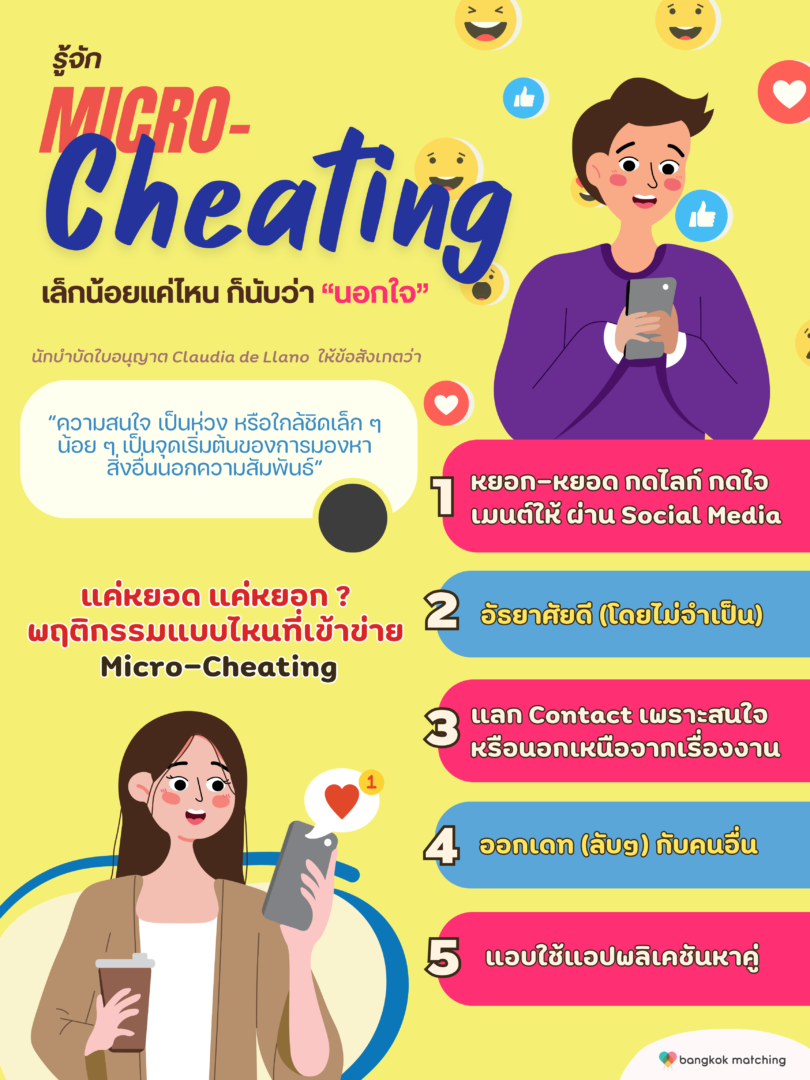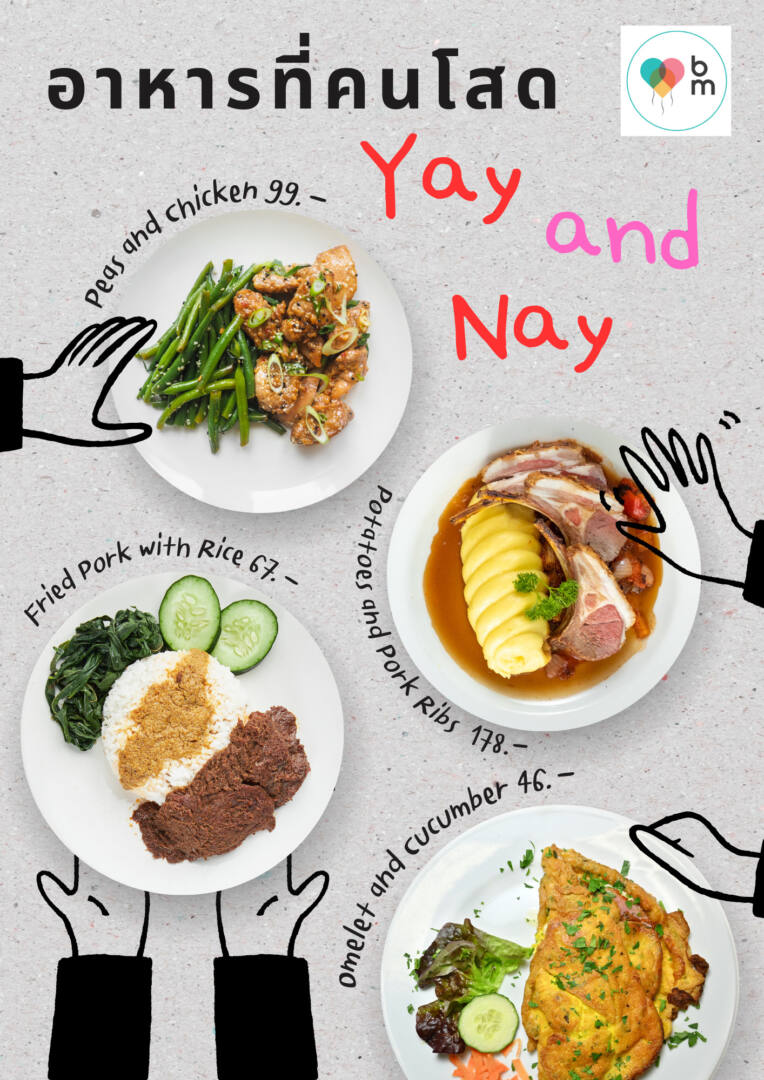New Gen falls in love through thoughts and attitudes. The ’36 Questions to Fall in Love’ – a tool designed to help people find their soulmates within 45 minutes.
From surveys of the new generation, or New Gen, which refers to people from Generation Z aged below 25, there is a growing trend of choosing to go on dates and fall in love with individuals who share similar “thoughts” and “attitudes.” They prefer dating and connecting with people who understand their mental and emotional perspectives before engaging in deeper conversations with those who lack such understanding. Knowing each other’s thoughts and perspectives allows them to envision a clearer future together. If they choose to date and build a long-term life with this person.
And according to surveys conducted by Bangkok Matching, a premium matchmaking and dating service agency, regarding the selection of dating and life partners for both Thai and foreign individuals, it was found that both men and women of all ages prioritize values, thoughts, and attitudes as the most important factors when choosing a serious partner. Following that, physical appearance, external appearance, status, and occupation become secondary considerations. This confirms that values, thoughts, and attitudes are crucial in choosing a genuine partner.
In simpler terms, it can be summarized as “Even if the appearance is attractive and pleasing, if our perspectives do not align, there wouldn’t be future.”
With this mindset, Bangkok Matching now see multiple online dating apps quickly adapting to the needs of the new generation by prioritizing features that facilitate partner matching based on attitudes. This comes in addition to creating online profiles, which might not clearly reflect one’s perspectives, unlike genuine and meaningful conversations. This is another indicator that dating solely based on external appearances is fading away in the new social era, where values and thoughts, the true essence of oneself, are becoming the determining factors in finding a partner where values and thoughts, the true essence of oneself, are becoming the determining factors in finding a partner.
Bangkok Matching, Thailand’s high end matchmaking and dating company, would like to introduce the “36 Questions to Fall in Love” theory, which was developed from an experiment conducted in 1997 by two renowned American psychologists, Arthur Aron and Elaine Aron. The couple spent years studying attraction, falling in love, and the patterns of romantic relationships.
The “36 Questions to Fall in Love” theory is a set of questions designed to foster intimacy and connection between two individuals. It was developed by psychologists Arthur Aron and Elaine Aron to study the process of falling in love and the development of romantic relationships. The theory proposes that by asking and answering these 36 specific questions, people can deepen their emotional connection and potentially develop romantic feelings for each other. The questions gradually become more personal and meaningful, encouraging participants to share their thoughts, feelings, and experiences, which can lead to a sense of closeness and affection.
The “36 Questions to Fall in Love” is a set of three questionnaires designed for you and your date to take turns asking and answering. Each set consists of 12 questions, and the depth of the questions increases with each set. These questions are meant to be used as conversation starters between you and your date. They are designed to reflect attitudes, perspectives, thoughts, decision-making, and personal aspects of the other person clearly within a short time frame of 30-45 minutes. It can be described as a way to “time warp” the dating process, allowing you to get to know each other deeply in just 45 minutes in a marvelous way.
The “36 Questions to Fall in Love” theory originated from an experiment conducted in 1997 by renowned psychologists Arthur Aron and Elaine Aron, who are a married couple themselves. In this experiment, they paired up several strangers and provided them with a set of 36 questions to exchange and discuss. The purpose of the experiment was to observe the effects and emotional responses that these sets of questions would elicit in each couple.
In the end of the experiment, it was found that couples who participated in the 36 Questions exchange felt closer and more intimate with each other compared to those who used plain questions. This is because they felt that they had shared their thoughts, feelings, and deep-seated attitudes with each other, as if they had opened their hearts and revealed their true selves at a spiritual level.

The research on the “36 Questions to Fall in Love” has even been published in the New York Times around 2015, making it widely popular. The experiment’s results indicated that when two strangers were paired together and exchanged these 36 questions in a test room, they felt closer, more intimate, and had a tendency to fall in love within a time frame of no more than 45 minutes. After participating in sharing these questions and answers together, the phenomenon quickly spread as a global trend.
The experiment using the “36 Questions to Fall in Love” theory yielded interesting results. Although the experiment conducted in 1997 was reported through an article titled “36 QUESTIONS FOR INCREASING CLOSENESS” from Stony Brook University and did not specify the exact number of participants, several psychologists have since tested this theory and found that it can indeed “increase feelings of closeness” and “intimacy.” Moreover, it has been shown to reduce superficial judgments based solely on appearances. The theory of the 36 questions is not limited to just finding romantic partners, but it has also been successfully applied in various aspects of building connections and relationships.
In an interesting experiment conducted around 2015 by the YouTube channel AsapSCIENCE, they tested the “36 Questions to Fall in Love” theory. The show invited two strangers, Emily and Cam, who had never met before, to participate in the experiment. The aim was to see if these 36 questions could genuinely lead two strangers to fall in love with each other or not.
The testing followed a step-by-step process, starting with both participants sitting face-to-face and taking turns asking questions continuously. The atmosphere intensified as they progressed through the sets of questions. They both acknowledged that during the conversation, they began to discover more and more interesting aspects of each other with each question and answer.
Before the final question concluded, there was a moment of silence lasting about 4 minutes, where they gazed at each other. When the time was up, both participants agreed that they felt good about exchanging deep thoughts, perspectives, and attitudes through these 36 questions. They also admitted that there was a high likelihood of continuing their relationship or arranging to meet again after the conclusion of this experiment.
Another case example comes from the renowned columnist Mandy Len Catron, who writes the “Modern Love” column for the New York Times. She revealed that she had personally tried this theory herself and the result was intriguing. She experimented with the 36-question set from this research and found that it could indeed foster a deep connection between herself and a stranger during that time. The experiment led to the development of a meaningful relationship between them, prompting her to incorporate the 36 questions theory into her column under the title “To Fall In Love With Anyone, Do This.” This gained even more attention and interest in the theory.
Why does the 36 Questions Theory still hold true today ?
Even though the 36 Questions Theory has been devised for nearly 30 years, it is still favored and yields positive results. In today’s fast-paced life, people often lack the time to invest in getting to know someone through traditional dating over several months or years. It’s impossible to predict if two individuals will be compatible in terms of perspectives, attitudes, or beliefs in the future. Therefore, if they attempt to date multiple times but ultimately have conflicting worldviews, it’s undoubtedly a waste of time, emotions, and resources in relationships that seem to lead in different directions.
The survey about the dating trends of Gen Z reveals that the 36 Questions Theory for falling in love can be effectively applied to address the dating lifestyle of modern-day Gen Z individuals. It can replace conventional dating and superficial questioning in daily life with a more certain approach.
Gen Z individuals emphasize getting to know the “true self” and prefer to see others express their “authenticity” rather than creating an image or pretending. Up to 75% of Gen Zs admit that if their partner has a good mindset, it becomes more attractive to them.
Gen Z individuals dislike wasting their valuable time on people who are not genuine and don’t align with their values.
Recently, even in Thailand, there was an experiment like this conducted not long ago. One participant shared their experience by writing a personal blog about the results of the experiment on March 20, 2016. The writer narrated their participation in the experiment, where the “36 Questions Theory” was used as the main axis to create an intimate feeling and to show that, after completing the experiment, they felt much closer and more acquainted with the other person. The process of asking and answering questions led to finding common ground in conversation, making the dialogue continuous and enjoyable. They felt as though they were no longer strangers as they initially thought.
Therefore, Bangkok Matching, Thailand’s high end matchmaking and dating company, believes that the 36 Questions Theory can serve as a helpful tool to expedite the process of falling in love. They want to recommend this theory as an option that fulfills the needs of modern-day Gen Z individuals seeking a partner.
The 36 questions:
Set I
- Given the choice of anyone in the world, whom would you want as a dinner guest?
- Would you like to be famous? In what way?
- Before making a telephone call, do you ever rehearse what you are going to say? Why?
- What would constitute a “perfect” day for you?
- When did you last sing to yourself? To someone else?
- If you were able to live to the age of 90 and retain either the mind or body of a 30-year-old for the last 60 years of your life, which would you want?
- Do you have a secret hunch about how you will die?
- Name three things you and your partner appear to have in common.
- For what in your life do you feel most grateful?
- If you could change anything about the way you were raised, what would it be?
- Take four minutes and tell your partner your life story in as much detail as possible.
- If you could wake up tomorrow having gained any one quality or ability, what would it be?
Set II
- If a crystal ball could tell you the truth about yourself, your life, the future, or anything else, what would you want to know?
- Is there something that you’ve dreamed of doing for a long time? Why haven’t you done it?
- What is the greatest accomplishment of your life?
- What do you value most in a friendship?
- What is your most treasured memory?
- What is your most terrible memory?
- If you knew that in one year you would die suddenly, would you change anything about the way you are now living? Why?
- What does friendship mean to you?
- What roles do love and affection play in your life?
- Alternate sharing something you consider a positive characteristic of your partner. Share a total of five items.
- How close and warm is your family? Do you feel your childhood was happier than most other people’s?
- How do you feel about your relationship with your mother?
Set III
- Make three true “we” statements each. For instance, “We are both in this room feeling…”
- Complete this sentence: “I wish I had someone with whom I could share…”
- If you were going to become a close friend with your partner, please share what would be important for him or her to know.
- Tell your partner what you like about them; be very honest this time, saying things that you might not say to someone you’ve just met.
- Share with your partner an embarrassing moment in your life.
- When did you last cry in front of another person? By yourself?
- Tell your partner something that you like about them already.
- What, if anything, is too serious to be joked about?
- If you were to die this evening with no opportunity to communicate with anyone, what would you most regret not having told someone? Why haven’t you told them yet?
- Your house, containing everything you own, catches fire. After saving your loved ones and pets, you have time to safely make a final dash to save any one item. What would it be? Why?
- Of all the people in your family, whose death would you find most disturbing? Why?
- Share a personal problem and ask your partner’s advice on how he or she might handle it. Also, ask your partner to reflect to you how you seem to be feeling about the problem you have chosen.
After completing all the questions, there’s a little additional trick – you and your date should sit in silence and look into each other’s eyes for 4 minutes without saying anything. During this quiet moment, you will become aware of whether the person in front of you is the one you are looking for, and you will know if the answer is “yes” or “no.”
Please share your result of the experiment as soon as it ends how you feel about it, does it work for you with Bangkok Matching via our line official @bangkokmatching or with your matchmaker or to email [email protected]
And there you have it – the 36 Questions Theory that helps people fall in love within the first date or in a short period, not exceeding 45 minutes. It is evident that nearly every question delves deep and measures one’s thoughts, attitudes towards themselves, family, dating partner, and their comprehensive worldview. Therefore, it’s not surprising that the 36 Questions Theory is popular and widely discussed worldwide.
What are the advantages and disadvantages of using the 36 Questions Theory in dating?
Certainly, using this theory has its advantages, but there may also be some limitations as well.
The advantages of the 36 Questions Theory are…
- Helps create a strong sense of intimacy quickly within a short period.
Based on the characteristics of Gen Z individuals, they often don’t want to waste time on trial and error in getting to know each other or creating overly positive images. Being true to oneself and sharing thoughts can lead to a better understanding of each other’s personalities. Additionally, dating can be costly, both financially and emotionally, which is why Gen Z individuals prefer to avoid multiple dating experiences.
- Open and honest communication fosters greater trust in dating.
As mentioned in the first point, in the age of Gen Z, being open and vulnerable is the key to building trust and confidence. Therefore, using the 36 Questions Theory can be a valuable tool in creating deep connections and quickly establishing trust between you and your date.
- It is an effective method for assessing compatibility in terms of ideas, attitudes, and perspectives on life.
Ideas are internal, and if the questions asked are not relevant or are too direct, it may create a negative impression. When there is a negative impression, it becomes challenging to rebuild the connection, no matter how positive the attitudes and perspectives may be. Therefore, using this theory is considered an effective approach, as the questions have been tested to not elicit overly negative emotions from the respondents. This allows for a good evaluation of the thoughts and attitudes of the date, yielding excellent results.
“Limitations of the 36 Questions Theory are…”
- Some people may not like using this question-and-answer approach as they feel it invades their privacy and moves too quickly.
- The conversation’s flow may become awkward or stilted when asking more challenging questions to someone you’ve just met.
- The conversation’s setting may induce tension, requiring careful control of the atmosphere.
Therefore, when choosing to use the 36 Questions Theory with a date to understand their attitudes and thoughts, you must ask with caution and carefully manage the conversational atmosphere to prevent it from becoming overly tense and ensure the theory’s success.
However, if asking a large number of questions with new strangers is challenging and creates too much stress for you, Bangkok Matching, a premium dating and matchmaking service, offers a solution. We can find a date that matches your preferences and specifications, using the data from your profile and selecting high-quality matches you are looking for. We strive to create the perfect dream date that leaves you fully satisfied! Come and experience the best dating experience with us, Bangkok Matching, the high-end dating company, right now!
Reference
- https://www.abc.net.au/triplej/programs/hack/the-36-questions-that-lead-to-love/8387736
- https://ornsmith.com/36-questions-bring-love-experience-sharing/
- https://www.tinderpressroom.com/2023-05-22-WELCOME-TO-A-RENAISSANCE-IN-DATING,-DRIVEN-BY-AUTHENTICITY
- https://www.mindbodygreen.com/articles/36-questions-to-fall-in-love
- https://ggia.berkeley.edu/index.php/practice/36_questions_for_increasing_closeness
- https://www.businessinsider.com/asapscience-youtube-36-questions-love-2015-12





